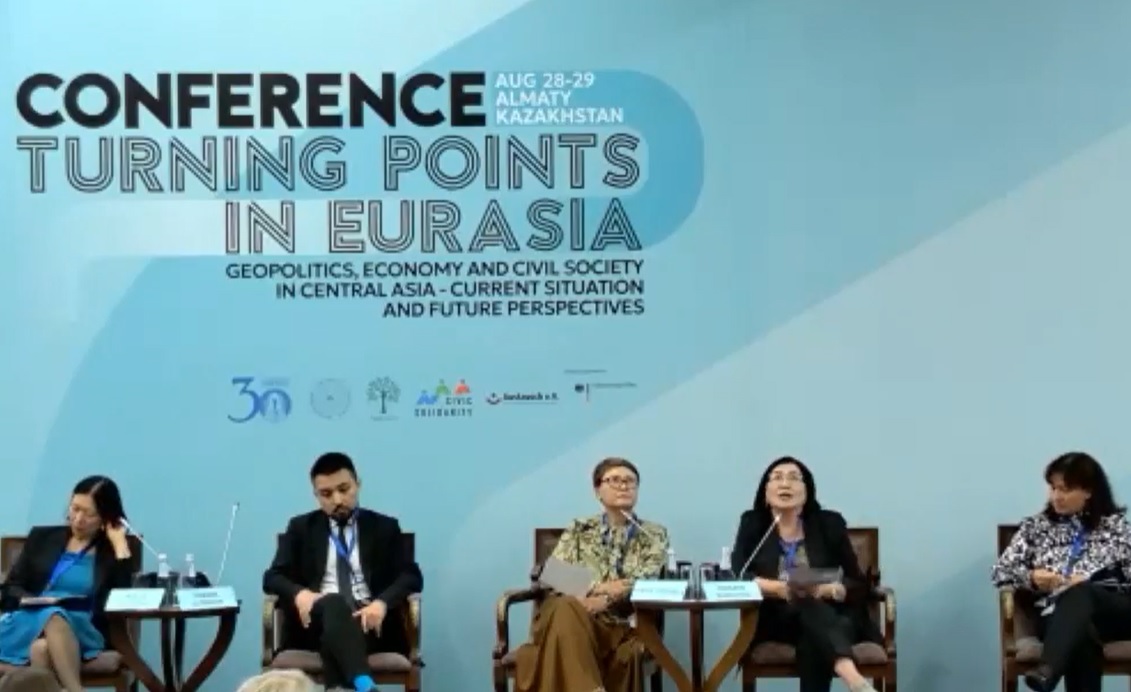'Central Asia hostage to authoritarianism and geopolitical pressures'
The denunciation of 200 activists from the five countries of the region gathered in Almaty thirty years after the independence of the ex-Soviet republics. In the face of the heavy economic crisis resulting from the Russian invasion of Ukraine and the social consequences of climate change, repression against any critical voice of governments is growing.
Almaty (AsiaNews) - The conference "Turning momentum in Eurasia", organized by the Office for Human Rights and respect for the law of Kazakhstan, was held in Almaty in recent days, which this year celebrates its thirtieth anniversary since its foundation, practically the same age as the independence of the post-Soviet republics of all Central Asia.
During the meeting, activists and specialists tried to very frankly explain the social problems of the region, for the solution of which "there is little time", according to most of the interventions. The organizers themselves called the inhabitants of these countries "hostages of internal authoritarianism and external geopolitical pressure".
According to some of the experts, the possibilities for transformation and adaptation are dwindling, following the expansion of Chinese influence and the Russian invasion of Ukraine, but above all due to the effects of the climate crisis, which seems to be developing in the region more faster than in other parts of the world.
Moreover, it cannot be denied that considerable progress has been made in the five Central Asian states since 1991, but the challenges still remain very impervious, starting with the very authoritarian and corrupt political system, largely inherited from the Soviet past.
The conference had a high impact, with few precedents, bringing together over 200 influential voices in Kazakhstan's most populous city. In the initial report, the director of the Office, Evgenij Žovtis, called on all those present to assume the responsibility of expressing themselves frankly on the many open problems, reporting the very negative assessments of all international observers on the effective freedom of speech in the States of the Central Asia.
One example is Kyrgyzstan, where higher levels of democratic freedoms seemed to have been achieved, which the current president Sadyr Žaparov seems to have however decided to renounce, despite all the conflicts, even violent ones, he went through to reach them.
Čolpon Džakupova, director of the non-profit association "Adilet Legal Clinic" in Bishkek complained about this: "we are especially saddened and concerned by the speed of these steps backwards, losing everything we had conquered over many years" .
Precisely during the conference, the Kyrgyz public prosecutor's office announced the closure of the Kloop website, known for its investigations into the corruption of the Kyrgyz elites.
More than twenty activists and journalists have been imprisoned for a year now for dissent on border issues with Uzbekistan, and there is no short-term way out for them, despite many protests.
Uzbekistan itself has certainly not comforted the hopes of those who counted on a greater defense of rights, after more than a quarter of a century of the authoritarian regime of Islam Karimov.
His successor, Shavkat Mirziyoyev, had inaugurated his presidency by abolishing forced labor for cotton-picking, but has since largely reverted to previous habits, with prosecutors and judges sending dissidents and journalists to jail without too much hesitation. Also in the other countries the situation does not allow us to envisage great improvements.
The war in Ukraine is putting all Asian countries in the face of a heavy economic crisis, which not even the Chinese giant can escape, with all its ambitions to dominate the rest of the continent.
Above all, the worsening climate situation in one of the regions poorest in water resources on the planet is creating growing concern. Kazakhstan, the ninth country in the world by territorial extension, suffers from this problem in a particularly acute way, depending on the course of rivers that originate in other countries.
The waters of the Volga and the Ural that flow into the Caspian Sea are decreasing, now more and more similar to the arid spectrum of the Aral lake. Strong discussions are underway with Kyrgyzstan, which has stated that it has no more reserves for the Kazakhs.
According to various speakers, all these systemic and environmental problems risk leading the citizens of Central Asian countries to "discrimination, persecution and even torture", if governments and civil society do not seek real answers together for the future .
09/06/2021 11:52







.png)










